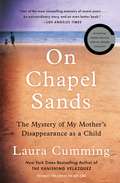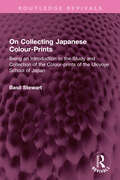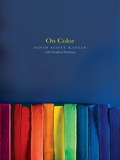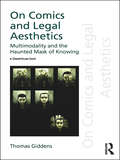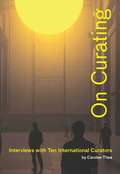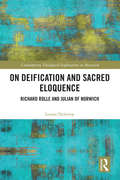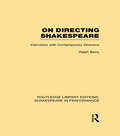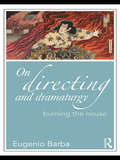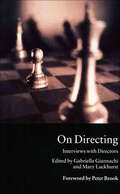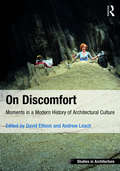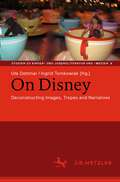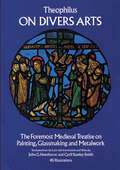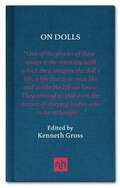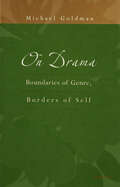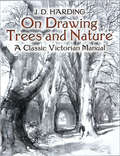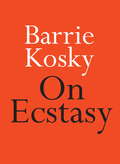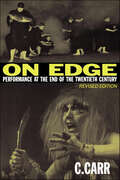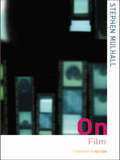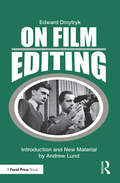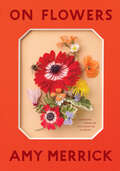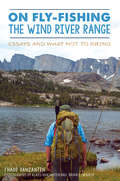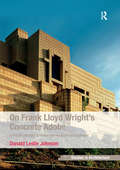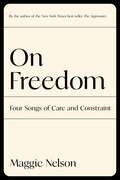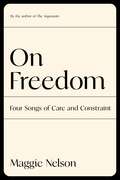- Table View
- List View
On Chapel Sands: The Mystery of My Mother's Disappearance as a Child
by Laura CummingNOMINATED FOR THE 2019 NATIONAL BOOK CRITICS CIRCLE AWARD FOR AUTOBIOGRAPHY ONE OF NPR'S BEST BOOKS OF THE YEAR SHORTLISTED FOR THE BAILLIE GIFFORD PRIZE FOR NONFICTION SHORTLISTED FOR THE RATHBONES FOLIO PRIZE LONGLISTED FOR THE RSL ONDAATJE PRIZE The acclaimed New York Times bestselling author of The Vanishing Velazquez shares a riveting true story &“with as many twists and turns as any mystery&” (Los Angeles Times) describing her mother&’s mysterious kidnapping as a toddler in a small English coastal village—&“an incredible and incredibly unusual book about family secrets&” (Nick Hornby, The Believer).In the fall of 1929, when Laura Cumming&’s mother was three years old, she was kidnapped from a beach on the Lincolnshire coast of England. There were no screams when she was taken, suggesting the culprit was someone familiar to her, and when she turned up again in a nearby village several days later, she was happy and in perfect health. No one was ever accused of a crime. The incident quickly faded from her memory, and her parents never discussed it. To the contrary, they deliberately hid it from her, and she did not learn of it for half a century. This was not the only secret her parents kept from her. For many years, while raising her in draconian isolation and protectiveness, they also hid the fact that she&’d been adopted, and that shortly after the kidnapping, her name was changed from Grace to Betty. &“Both page-turning and richly absorbing&” (The Providence Journal), On Chapel Sands (originally titled Five Days Gone) unspools the tale of Cumming&’s mother&’s life and unravels the multiple mysteries at its core. Using photographs from the time, historical documents, and works of art, Cumming investigates this case of stolen identity with the toolset of a detective and the unique intimacy of a daughter trying to understand her family&’s past and its legacies. &“Brilliant&” (The Guardian) and &“a story told with such depth of feeling and observation and such lyrical writing I couldn&’t put it down&” (Anna Quindlen), On Chapel Sands is a masterful blend of memoir and history, an extraordinary personal narrative unlike any other.
On Collecting Japanese Colour-Prints: Being an Introduction to the Study and Collection of the Colour-prints of the Ukiyoye School of Japan (Routledge Revivals)
by Basil StewartFirst published in 1917, On Collecting Japanese-Prints is meant to assist the amateur who has started a collection for the first time, or the person who, while not actually a collector, is sufficiently interested to read about the subject, yet finds the more exhaustive and advanced works thereon somewhat beyond them. How to distinguish forgeries and imitations; what prices should be given; what examples can still be obtained, are some of the questions which the writer has attempted to answer. The following chapters being primarily written for the beginner, artists whose work is very rare, or whose prints they are unlikely to come across in their search for examples, are not mentioned, unless where necessary from a historical or artistic point of view.
On Color
by David Kastan Stephen FarthingOur lives are saturated by color. We live in a world of vivid colors, and color marks our psychological and social existence. But for all color’s inescapability, we don’t know much about it. <P><P>Now authors David Scott Kastan and Stephen Farthing offer a fresh and imaginative exploration of one of the most intriguing and least understood aspects of everyday experience. Kastan and Farthing, a scholar and a painter, respectively, investigate color from numerous perspectives: literary, historical, cultural, anthropological, philosophical, art historical, political, and scientific. <P> In ten lively and wide-ranging chapters, each devoted to a different color, they examine the various ways colors have shaped and continue to shape our social and moral imaginations. Each individual color becomes the focal point for a consideration of one of the extraordinary ways in which color appears and matters in our lives. <P>Beautifully produced in full color, this book is a remarkably smart, entertaining, and fascinating guide to this elusive topic.
On Comics and Legal Aesthetics: Multimodality and the Haunted Mask of Knowing
by Thomas GiddensWhat are the implications of comics for law? Tackling this question, On Comics and Legal Aesthetics explores the epistemological dimensions of comics and the way this once-maligned medium can help think about – and reshape – the form of law. Traversing comics, critical, and cultural legal studies, it seeks to enrich the theorisation of comics with a critical aesthetics that expands its value and significance for law, as well as knowledge more generally. It argues that comics’ multimodality – its hybrid structure, which represents a meeting point of text, image, reason, and aesthetics – opens understanding of the limits of law’s rational texts by shifting between multiple frames and modes of presentation. Comics thereby exposes the way all forms of knowledge are shaped out of an unstructured universe, becoming a mask over this chaotic ‘beyond’. This mask of knowing remains haunted – by that which it can never fully capture or represent. Comics thus models knowledge as an infinity of nested frames haunted by the chaos without structure. In such a model, the multiple aspects of law become one region of a vast and bottomless cascade of perspectives – an infinite multiframe that extends far beyond the traditional confines of the comics page, rendering law boundless.
On Curating: Interviews with Ten International Curators
by Carolee Thea Thomas Micchelli Hans Ulrich ObristOn Curating, Carolee Thea's second volume of interviews with ten of today's leading curators, explores the intellectual convictions and personal visions that lay the groundwork for the most prestigious and influential exhibitions in the world today. Among the aesthetic and theoretical issues raised are the relationship between artist and curator, globalism, post-colonialism, capitalism, the future of cultural tourism and the biennial as spectacle or utopian ideal. As Thea notes in her introduction, "the biennial or mega-exhibition--a laboratory for experimentation, investigation and aesthetic liberation--is where the curators' experience and knowledge are tested. As they negotiate venues for artistic expression, intellectual critiques and humanistic concerns in their own societies and others, they are challenged by the certainties and uncertainties of a constantly evolving future." Thea's interviewees are Joseph Backstein, Carolyn Christov-Bakargiev, Okwui Enwezor, Charles Esche, Massimiliano Gioni, RoseLee Goldberg, Mary Jane Jacob, Pi Li, Virginia Perez-Ratton and Rirkrit Tiravanija. On Curating also includes 50 color illustrations of relevant works by (among others) Kutlug Ataman, Tamy Ben-Tor, John Bock, Cao Fei, Olafur Eliasson, Isaac Julien, Francois & Philippe Parreno, Yvonne Rainer, Michael Rakowitz, Doris Salcedo, Allan Sekula, Yinka Shonibare and Francesca Woodman.Carolee Thea is a curator, critic, art historian and independent scholar. Her first book, Foci: Interviews with Ten International Curators was published in 2001. She is contributing editor at ArtAsiaPacific and Sculpture magazine and was the English editor of Atlántica 45. Her articles, reviews and interviews have been published in many arts journals, among them Parkett, Artforum.com, The New Art Examiner, Modern Painters, Artnet.com, ZSijue 21 Beijing, Heresies, Tema Celeste, Parachute and ArtNews.
On Deification and Sacred Eloquence: Richard Rolle and Julian of Norwich (Contemporary Theological Explorations in Mysticism)
by Louise NelstropThis book considers the place of deification in the writings of Julian of Norwich and Richard Rolle, two of the fourteenth-century English Mystics. It argues that, as a consequence of a belief in deification, both produce writing that is helpfully viewed as sacred eloquence. The book begins by discussing the nature of deification, employing Norman Russell’s typology. It explores the realistic and ethical approaches found in the writings of several Early Greek Fathers, including Irenaeus of Lyons, Cyril of Alexandria, Origen, and Evagrius Ponticus, as well as engaging with the debate around whether deification is a theological idea found in the West across its history. The book then turns its attention to Julian and Rolle, arguing that both promote forms of deification: Rolle offering a primarily ethical approach, while Julian’s approach is more realistic. Finally, the book addresses the issue of sacred eloquence, arguing that both Rolle and Julian, in some sense, view their words as divinely inspired in ways that demand an exegetical response that is para-biblical. Offering an important perspective on a previously understudied area of mysticism and deification, this book will be of interest to scholars of mysticism, theology, and Middle English religious literature.
On Directing Shakespeare (Routledge Library Editions: Shakespeare in Performance)
by Ralph BerryFor producers and directors planning a production, several questions inevitably arise: Which play is appropriate for the contemporary audience? Should the text and setting be altered? Twelve leading contemporary directors answer these questions in interviews in this book and shed light on what Shakespeare means to them and to their audiences. Originally published in 1977.
On Directing and Dramaturgy: Burning the House
by Eugenio Barba"A theatre which is able to speak to each spectator in a different and penetrating language is not a fantastic idea, nor a utopia. This is the theatre for which many of us, directors and leaders of groups, trained for a long time....." - from the Introduction On Directing is Eugenio Barba's unprecedented account of his own life and work. This is a major retrospective of Barba's working methods, his practical techniques, and the life experiences which fed directly into his theatre-making. On Directing is an inspirational resource. It is a dramaturgy of dramaturgies, and a professional autobiography, from one of the most significant and influential directors and theorists working today. It provides unique insights into a philosophy and practice of directing for the beginning student, the experienced practitioner, and everyone in between.
On Directing: Interviews with Directors
by Gabriella Giannachi and Mary LuckhurstThe profession of directing is barely a century old. On Directing considers the position of the director in theater and performance today. What is a director? How do they begin work on a play or performance? What methods are used in rehearsal? Is the director an enabler, a collaborator or dictator? As we enter the new millennium, is the very concept of directing under increasing threat from changes in thinking and practice? The full diversity of today's approaches to directing are explored through a series of interviews with leading contemporary practitioners. On Directing is a landmark book about the director's craft.
On Discomfort: Moments in a Modern History of Architectural Culture (Ashgate Studies in Architecture)
by Andrew Leach David EllisonExamining discomfort’s physical, emotional, conceptual, psychological and aesthetic dimensions, the contributors to this volume offer an alternate, cultural approach to the study of architecture and the built environment. By attending to a series of disparate instances in which architecture and discomfort intersect, On Discomfort offers a fresh reading of the negotiations that define architecture’s position in modern culture. The essays do not chart comfort’s triumph so much as discomfort’s curious dispersal into practices that form ‘modern life’ – and what that dispersion reveals of both architecture and culture. The essays presented in this volume illuminate the material culture of discomfort as it accrues to architecture and its history. This episodic analysis speaks to a range of disciplinary fields and interdisciplinary subjects, extending our understanding of the domestication of interiors (and objects, cities and ideas); and the conditions under which – by intention or accident – they discomfort.
On Disney: Deconstructing Images, Tropes and Narratives (Studien zu Kinder- und Jugendliteratur und -medien #9)
by Ute Dettmar Ingrid TomkowiakDisney – This name stands not only for a company that has had global reach from its early days, but also for a successful aesthetic programme and ideological positions that have had great commercial success but at the same time have been frequently criticised. Straddling traditionalism and modernism, Disney productions have proven adaptable to social discourses and technical and media developments throughout its history. This volume brings together scholars from several European countries to explore various dimensions that constitute ‘Disney.’ In line with current media and cultural studies research, the chapters deal with human-human and human-animal relations, gender and diversity, iconic characters and narratives, Disney’s contribution to cultural and visual heritage, and transmedial and transfictional spaces of experience and practices of participation associated with Disney story worlds.
On Divers Arts (Dover Art Instruction)
by John G. Hawthorne C. S. Smith Theophilus"I have made it my concern to hunt out this technique for your study as I learned it by looking and listening." On Divers Arts, c. 1122, is the oldest extant manual on artistic crafts to be written by a practicing artist. Before Theophilus, manuscripts on the arts came from scholars and philosophers standing outside the actual profession. On Divers Arts describes actual 12th-century techniques in painting, glass, and metalwork, which the Benedictine author wished to pass on to those gifted by God with a talent for making beautiful things. Theophilus teaches, with rigorous attention to fact but also with great reverence the making of pigments for fresco painting, the manufacture of glue, the technique of gold leaf on parchment (the first recorded European reference to true paper), how to blow glass and design stained glass windows, how to fashion gold and silver chalices, and how to make a pipe organ and church bells. Precise instruction on enameling, chasing, repoussé, niello, and beaded wire work prove Theophilus's first-hand knowledge of his craft.While 90 percent of Theophilus's writing is sound technical knowledge, medieval folk lore occasionally spices his text: "Tools are also made harder by hardening them in the urine of a small red-headed boy than by doing so in plain water." But the magnificent fact of On Divers Art remains its status as the first technical treatise on painting, glass, and metalwork, for which actual specimens still survive. The editors have taken care to ensure both philological and technological accuracy for this authoritative edition of a medieval classic, a manual of great importance to craftsmen, historians of art and science, and all who delight in the making of the beautiful.
On Dolls
by Kenneth GrossSome of the greatest thinkers and writers of our age meditate on play and the mysteries of inanimate life.This unusual literary collection contains writings from Baudelaire, Kleist, Rilke, Freud, Kafka, Walter Benjamin, Bruno Schulz, Elizabeth Bishop, Dennis Silk, and Marina Warner. The essays and reflections explore the seriousness of play and the mysteries of inanimate life - 'the unknown, spaces, dust, lost objects, and small animals that fill any house' - which have provoked many writers to take the side of these dead or non-human things, resulting in some of the most profound passages in literature. The collection is introduced and edited by Kenneth Gross. On Dolls includes contributions from: Heinrich Von Kleist 'On the Marionette Theatre', Charles Baudelaire 'The Philosophy of Toys', Sigmund Freud 'The Uncanny', Rainer Maria Rilke 'On the Dolls of Lotte Pritzel', Frank Kafka 'The Cares of a Family Man', Bruno Schulz 'Tailor's Dummies', Walter Benjamin 'Old Toys: The Toy Exhibition at the Markisches Museum', Elizabeth Bishop, 'Cirque d'Hiver', Dennis Silk 'The Marionette Theatre', and Marina Warner 'On the Threshold: Sleeping Beauties'.
On Drama: Boundaries of Genre, Borders of Self (Theater: Theory/Text/Performance)
by Michael GoldmanThe latest book by noted critic and scholar Michael Goldman provides fresh and unexpected insights into the role played by genre in the experience of drama. Challenging the view that genre is by definition exclusion, and that its policing of boundaries is out of place in the neighborhood of art, Michael Goldman suggests that the lens of genre can provide keen insights for our understanding and appreciation of drama. For Goldman, it is important to consider drama as an exper-ience, an ongoing moment-to-moment process for audiences or readers. Everything changes, says Goldman, when we stop to think of genre as not entirely unlike rhyme or ambiguity--features whose primary interest for readers or audiences is as something that happens to us in a poem or play, as it happens. It is valuable to see that--as it operates in drama--the instability of the subject of genre has a specific and unique texture, one that can offer useful insights into our experience as viewers of and participants in drama. In this light, discussions of genre can help us to understand what drama as a special kind of social practice does for and with our lives. It is important that we work toward understanding the process of thinking about drama in this light--that we understand the power and complexity of drama--and Michael Goldman aims to do so in this book. Michael Goldman is Professor of English, Princeton University. He is author of a number of books, including Acting and Action in Shakespearean Tragedy, Shakespeare and the Energies of Drama, Ibsen: The Dramaturgy of Fear, and The Actor's Freedom: Toward a Theory of Drama.
On Drawing Trees and Nature: A Classic Victorian Manual with Lessons and Examples
by J. D. HardingThis classic of art instruction is the work of James Duffield Harding (1798-1863), who served as drawing master and sketching companion to the great Victorian art critic, John Ruskin. Generations of students have benefited from the teachings of this 19th-century master, who sought always to "produce as near a likeness to Nature, in every respect, as the instrument, or material employed, will admit of; not so much by bona fide imitation, as by reviving in the mind those ideas which are awakened by a contemplation of Nature . . . The renewal of those feelings constitutes the true purpose of Art."This volume consists of direct reproductions of Harding's sketches of vignettes from natural settings. Each is accompanied by a series of lessons emphasizing both practical and theoretical considerations. The edition features the added attraction of 23 outstanding plates from the author's Lessons on Trees.
On Ecstasy
by Barrie Kosky'My polish grandmother made a chicken soup like no other chicken soup. To this day, it has, to my knowledge and experience, never been bettered ... Her chicken soup was the Caravaggio of soups. The Rainer Marie Rilke of soups. The Arturo Benedetti Michelangeli of soups.'A compelling and entertaining stoyteller, Barrie Kosky explores the feelings of intense joy and delight, as well as the power and terror that is ecstasy.
On Edge: Performance at the End of the Twentieth Century
by Cynthia CarrThrough her engaged and articulate essays in the Village Voice, C. Carr has emerged as the cultural historian of the New York underground and the foremost critic of performance art. On Edge brings together her writings to offer a detailed and insightful history of this vibrant brand of theatre from the late 70s to today. It represents both Carr's analysis as a critic and her testament as a witness to performances which, by their very nature, can never be repeated.Carr has organized this collection both chronologically and thematically, ranging from the emphasis on bodily manipulation/endurance in the 70s to the underground club scene in New York to an insider's analysis of the Tompkins Square Riot as a manifestation of the cultural and social conflicts that underlie much of performance art. She examines the transgressive and taboo-shattering work of Ethyl Eichelberger, Karen Finley, and Holly Hughes; documents specific performances by Annie Sprinkle and Lydia Lunch; and maps the development of such artists as Robbie McCauley, Blue Man Group, and John Jesurun. She also describes the "cross-over" phenomenon of the mid-80s and considers the far-right backlash against this mainstreaming as cultural reactionaries sought to curb the influence of these new artists.CONTRIBUTORS: Linda Montano, Chris Burden, G.G Allin, Jean Baudrillard, Patty Hearts, Dan Quayle, Anne Magnouson, John Jesurun, John Kelly, Shu Lea Changvv, Diamanda Galas, Salley May, Rafael Mantanez Ortiz, Sherman Fleming, Kristine Stiles, Laurie Carlos, Jessica Hafedorn, Robbie McCormick, Karen Finley, Poopo Shiraishi, Donna Henes, Holey Hughe, Ela Troyano, Michael Smith, Harry Koipper, John Sex, Nina Jagen, Ethyl Eichelberge, Marina Abramovic, Ulay.
On Film (Thinking in Action)
by Stephen MulhallFirst published in 2002. Routledge is an imprint of Taylor & Francis, an informa company.
On Film Editing: An Introduction to the Art of Film Construction (Edward Dmytryk: On Filmmaking)
by Edward DmytrykIn On Film Editing, director Edward Dmytryk explains, in clear and engaging terms, the principles of film editing. Using examples and anecdotes from almost five decades in the film industry, Dmytryk offers a masterclass in film and video editing. Written in an informal, "how-to-do-it" style, Dmytryk shares his expertise and experience in film editing in a precise and philosophical way, contending that all parties on the film crew—from the camera assistant to the producer and director—must understand film editing to produce a truly polished work. <p><p>Originally published in 1984, this reissue of Dmytryk’s classic editing book includes a new critical introduction by Andrew Lund, as well as chapter lessons, discussion questions, and exercises.
On Flowers: Lessons from an Accidental Florist
by Amy MerrickA singular, personal celebration of the beauty and possibilities of nature Amy Merrick is a rare and special kind of artist who uses flowers to help us see the familiar in a completely new way. Her gift is to revel in the unexpected—like a sunny spring arrangement housed in a paper coffee cup—and to overturn preconceptions, whether she’s transforming a bouquet of supermarket carnations into a breathtaking centerpiece or elevating wild and weedy blooms foraged from city sidewalks. She uses the beauty that is waiting to be discovered all around us—in leaves, branches, seedpods, a fallen blossom—to tell a story of time and place. Merrick begins On Flowers with a primer containing all her hard-won secrets on the art of flower arranging, from selecting materials to mastering pleasing proportions. Then she brings readers along on her journey, with observations on flowers in New York City and at her family’s summer home in rural New Hampshire, working on a flower farm off the coast of Washington State, and studying ikebana in a jewel-box flower shop in Kyoto. We learn how to send flowers like a florist, and how to arrange them like a farm girl. We discover the poignancy in humble wildflowers, and also celebrate the luxury of fragrant blousy blooms. Collected here is an anthology of floral inspiration, a love letter to nature by an exceptional, accidental florist.
On Fly-Fishing the Wind River Range: Essays and What Not to Bring (Narrative)
by Chadd VanZanten Klaus VanZanten Brian L. SchieleWith remote waterways and unpressured trout, Wyoming's Wind River Range is the backcountry fly angler's mecca. In the alpine lakes and streams, trout may approach a dry fly two or more at a time, and an angler can cast for days without seeing another person, let alone another angler. But more than just a place to catch lots of fish, the range is also a place to disconnect from noise and networks and reconnect with oneself. In a series of essays on misfortunate father-and-son backpacking trips, disaffected Boy Scouts, psychotropic deep-woods epiphanies and many other topics, author Chadd VanZanten offers not only a survey of the fishing and history of the Wind Rivers but a tour of personal landscapes as well.
On Frank Lloyd Wright's Concrete Adobe: Irving Gill, Rudolph Schindler and the American Southwest (Ashgate Studies in Architecture)
by Donald Leslie JohnsonDuring the years 1919 into 1925 Frank Lloyd Wright worked on four houses and a kindergarten located in metropolitan Los Angeles using concrete blocks as the main building material. The construction system has been described by Wright and others as ’uniquely molded’, ’woven like a textile fabric’ and perceived as ground breaking, truly modern, unprecedented. Many have attempted to uphold these claims while some thought the house-designs borrowed from old exotic buildings. For the first time this book brings together Wright’s declarations, the support of upholders and inferences in order to determine their accuracy and correctness, or the possibility of feigned or fictional stories. It examines technical developments of concrete blocks by Wright and others before his experiences in Los Angeles began in 1919. It also studies the manner of Wright’s design process by an examination of relevant pictorial and textual documents. A unique, in-depth and critical analysis of the houses is set within historical, biographical and theoretical contexts. Consequently, the book explains the impact upon Wright of California contemporaries, architects Irving Gill and Rudolph Schindler, and their instrumentally profound role upon the course of modernism 1907-1923. In doing so, it allows a full appreciation of Wright’s, Gill’s and Schindler’s buildings beyond their experiential qualities.
On Freedom: Four Songs of Care and Constraint
by Maggie NelsonSo often deployed as a jingoistic, even menacing, rallying cry, or limited by a focus on passing moments of liberation, the rhetoric of freedom both rouses and repels. Does it remain key to our autonomy, justice, and well-being, or is freedom's long star turn coming to a close? Does a continued obsession with the term enliven and emancipate, or reflect a deepening nihilism (or both)? On Freedom is an expansive, exhilarating work of criticism that examines such questions by tracing the concept's complexities in four distinct realms: art, sex, drugs, and climate. Drawing on a vast range of material, from critical theory to pop culture to the intimacies and plain exchanges of daily life, Maggie Nelson explores how we might think, experience, or talk about freedom in ways responsive to the conditions of our day. Her abiding interest lies in ongoing "practices of freedom" by which we negotiate our interrelation with--indeed, our inseparability from--others, with all the care and constraint that entails, while accepting difference and conflict as integral to our communion. For Nelson, thinking publicly through the knots in our culture--from recent art-world debates to the turbulent legacies of sexual liberation, from the painful paradoxes of addiction to the lure of despair in the face of the climate crisis--is itself a practice of freedom, a means of forging fortitude, courage, and company. On Freedom is an invigorating, essential book that meets the challenges of our time. Maggie Nelson is the author of several books of poetry and prose, including, most recently, the New York Times best seller and National Book Critics Circle Award winner The Argonauts. She has been the recipient of a MacArthur Fellowship, a Guggenheim Fellowship, an NEA Fellowship, an Innovative Literature Fellowship from the Creative Capital Foundation, and an Arts Writers Grant from the Andy Warhol Foundation. She is currently a professor of English at University of Southern California and lives in Los Angeles. A New York Times Notable Book for 2021.
On Freedom: Four Songs of Care and Constraint
by Maggie NelsonNamed a Most Anticipated/Best Book of the Month by: NPR * USA Today * Time * Washington Post * Vulture * Women’s Wear Daily * Bustle * LitHub * The Millions * Vogue * Nylon * Shondaland * Chicago Review of Books * The Guardian * Los Angeles Times * Kirkus * Publishers WeeklySo often deployed as a jingoistic, even menacing rallying cry, or limited by a focus on passing moments of liberation, the rhetoric of freedom both rouses and repels. Does it remain key to our autonomy, justice, and well-being, or is freedom’s long star turn coming to a close? Does a continued obsession with the term enliven and emancipate, or reflect a deepening nihilism (or both)? On Freedom examines such questions by tracing the concept’s complexities in four distinct realms: art, sex, drugs, and climate.Drawing on a vast range of material, from critical theory to pop culture to the intimacies and plain exchanges of daily life, Maggie Nelson explores how we might think, experience, or talk about freedom in ways responsive to the conditions of our day. Her abiding interest lies in ongoing “practices of freedom” by which we negotiate our interrelation with—indeed, our inseparability from—others, with all the care and constraint that entails, while accepting difference and conflict as integral to our communion.For Nelson, thinking publicly through the knots in our culture—from recent art-world debates to the turbulent legacies of sexual liberation, from the painful paradoxes of addiction to the lure of despair in the face of the climate crisis—is itself a practice of freedom, a means of forging fortitude, courage, and company. On Freedom is an invigorating, essential book for challenging times.
